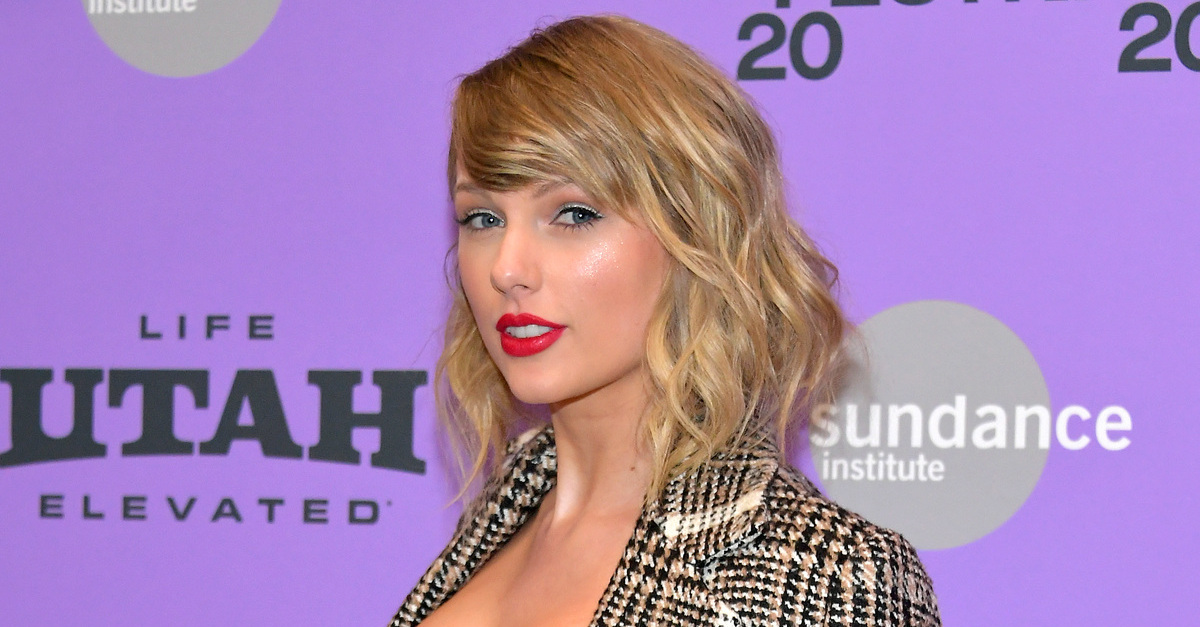
PARK CITY, UTAH – JANUARY 23: Taylor Swift attends the 2020 Sundance Film Festival – “Miss Americana” Premiere at Eccles Center Theatre on January 23, 2020 in Park City, Utah.
Taylor Swift’s intellectual property management company is suing a theme park in Utah for copyright infringement after previously being sued by the same theme park for trademark infringement.
On Feb. 2, Evermore Park filed a 35-page lawsuit against the pop singer in Utah District Court alleging that Swift’s recent evermore album misappropriated the theme park’s own trademark.
The filing argues that Swift “now seeks to bury the previously released Evermore albums created by Evermore” and that various promotional efforts and merchandise bearing the album title are “counterfeit goods because they use a spurious mark that is identical” to the theme park’s own previously registered trademark.
“[Swift’s] actions have caused actual confusion, mistake, or deception regarding the source, sponsorship, and/or affiliation of [Swift’s] goods and services,” the theme park’s lawsuit alleges. “[Swift’s] actions are likely to cause confusion, mistake, or deception in violation of [federal trademark law].”
On Monday, Swift fired back—by way of TAS Rights Management, the Nashville, Tennessee-based LLC that filed eight intent-to-use trademark applications with the U.S. Patent and Trademark Office (USPTO) late last year for the singer’s evermore album.
Swift’s public persona is, in part, premised on a reputation for staking out artists’ royalty and ownership rights. And her management firm’s lawsuit leans heavily into artist ownership theory.
From the 17-page Middle District of Tennessee filing:
[The public performance rights] process is based on the fundamental principle that artists should be compensated for their work, and countless creators around the globe depend on honest compliance with this system.
Accounting for instances where the foregoing system would be flouted—or outright ignored—by entities seeking to profit from music without compensating creators, Congress provided for a federal infringement claim to compensate creators and, critically, to discourage infringement. This enforcement mechanism remains a fundamental element of the legal protections afforded to artists; without it, any entity could willfully deny compensation to artists for years, and then paper over its unlawful conduct with an email after the fact, as the Defendants attempt to do here.
Chief among Swift’s counter-complaints against the fantasy-based theme park are allegations that the park’s operators have been playing at least three of her songs, “among many other copyrighted compositions,” without obtaining licenses to do so.
Those songs are “Love Story,” “You Belong With Me,” and “Bad Blood.” Notably, none of them appear on the evermore album.
According to the TAS lawsuit, Evermore Park and its owner/creator/CEO Ken Bretschneider have been flouting the royalty regime by playing songs upon request since 2019—despite being repeatedly warned by Broadcast Music, Inc. (BMI), one of the two major performing rights organizations that protect works and compositions written and performed by recording artists.
“Recently, and only after this lawsuit became imminent, [Evermore and Bretschneider] have reached out to BMI in an overt attempt to cover up their years of unlawful conduct and intentional failure to compensate artists, admitting that any prior use was without license or authorization,” the copyright lawsuit alleges. “Accordingly, [TAS] brings this action to recover damages and to enjoin [Evermore and Bretschneider] from continued infringement.”
The lawsuit directly implicates Bretschneider and contains a vicarious copyright infringement cause of action, a common form of secondary liability which attaches if a party has the “right and ability to supervise the infringing activity” and “‘a direct financial interest’ in the activity.”
The filing notes and alleges: “Bretschneider is the CEO of Evermore Park LLC and oversees and directs the daily operations of Evermore Park, including attendance and even direct encouragement of the performances of the copyrighted [songs]. The creation of Evermore Park was the culmination of a lifelong dream of Defendant Bretschneider’s. As such, Defendant Bretschneider personally participated in the actual copyright infringement.”
Swift’s management company marshals a bit of recent activity in service of their claim that Evermore and their CEO knew about the nature of the alleged violation—namely that they attempted to cover their tracks by purchasing retroactive licenses earlier this month.
“[W]hen the filing of this action became imminent and known to Defendants, and in an attempt to cover up their willful infringement, Defendant Bretschneider, on behalf of Defendant Evermore Park LLC, called the Nashville, Tennessee office of BMI seeking a retroactive license that would cover all public performances from 2018, 2019, 2020, and 2021,” the lawsuit alleges. “Defendant Bretschneider also sent an email to the Nashville, Tennessee office of BMI furthering his request for a retroactive license.”
TAS claims to have only learned about the theme park’s alleged copyright infringement the day after the theme park sued Swift for trademark infringement.
“[TAS’s] counsel was contacted on February 3, 2021 by a former Evermore Park volunteer and frequent patron of Evermore Park, advising of the unlicensed public performance of [Swift’s] music,” the lawsuit continues. “Information was provided by this individual proving [Evermore’s] infringement of the copyrighted works.”
After learning about the volunteer reaching out to Swift’s team, Evermore moved to obtain the proper licenses, the lawsuit claims, in an effort “to fabricate a record to justify and retroactively authorize their intentional infringement,” according to the TAS lawsuit.
The timeline of the back-and-forth legal filings are likely to invite scrutiny. The docket for the theme park’s originally-filed lawsuit already references the TAS action. Law&Crime reached out to attorneys for both Swift and Evermore Park but no response was forthcoming at the time of publication.
[image via Neilson Barnard/Getty Images]